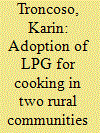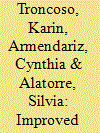| Srl | Item |
| 1 |
ID:
168650


|
|
|
|
|
| Summary/Abstract |
In 2011, a government initiative provided Liquefied Petroleum Gas (LPG) stoves and cylinders to almost 1000 rural families in Chiapas, Mexico. In 2017, the Pan-American Health Organization (PAHO) conducted an evaluation of cooking practices among the beneficiaries of these stoves.
|
|
|
|
|
|
|
|
|
|
|
|
|
|
|
|
| 2 |
ID:
125759


|
|
|
|
|
| Publication |
2013.
|
| Summary/Abstract |
Until now, the success of improved cook stoves (ICS) implementation programs has usually been measured by the number of ICS distributed. Some important research has been conducted to try to determine the effects of the use of an ICS in the user's health, but these studies are expensive and time consuming. Moreover, no evaluations show the impact of the technology in the user's lives. This study seeks to contribute to fill this gap.
|
|
|
|
|
|
|
|
|
|
|
|
|
|
|
|
| 3 |
ID:
110701


|
|
|
|
|
| Publication |
2011.
|
| Summary/Abstract |
The adoption of innovations in rural areas depends, among many different factors, on the way development workers approach a community. Through a qualitative research methodology this study documented the adoption of a new technology, by following an improved cookstove implementation program carried out by a Mexican NGO. This technology reduces fuel consumption and addresses health impacts of indoor air pollution caused by the widespread use of traditional biomass fuels in open fires in developing countries. Different demographic and socio-economic factors have been analyzed to explain the low success rates implementation projects have faced worldwide, but there are almost no studies that examine the problem from the perspective of implementers. The aim of this study was to understand how the different visions of the individuals involved in an implementation program affect its outcome. Findings showed that the NGO work was constrained by the need to meet the commitment with sponsors. The adoption rates did not change between the first and the second stage of the project, even though the approach towards users was very different. A lack of a shared vision among the work team towards the project was found and the existence of two main perspectives among program workers-broadly described as people-centered and technology-centered-, gave place to differences in attitudes towards the program.
|
|
|
|
|
|
|
|
|
|
|
|
|
|
|
|